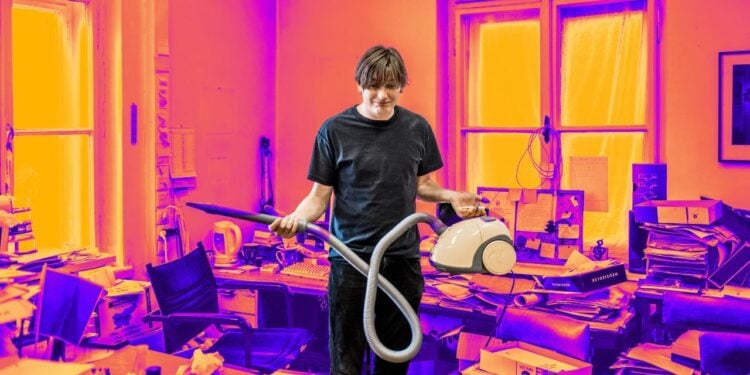- Organizational styles vary; choosing a system that enhances productivity and comfort is key.
- Clutter is not inherently negative, but it becomes problematic when it affects work or mental health.
- Identifying personal organization preferences and adjusting the workspace accordingly can improve productivity and mental well-being.
When we discuss the benefits of staying organized, it’s easy to pigeonhole organization into a rigid idea.
A sterile desk, several filing cabinets, and a sliding drawer that hosts several pens and pencils may automatically come to mind when you think of an organized office, but in reality, organization doesn’t need to look this way. The way you organize is entirely secondary to which style makes you more productive, comfortable, and motivated.
Despite these differences, the importance of organization cannot be overstated.
A recent National Geographic article emphasizes the benefits of organization on mental health, but it makes the comparison that clutter and disorganization are the same when this couldn’t be further from the truth. Additionally, many of the benefits mentioned are a result of general cleanliness rather than strict organizational adherence.
Rather than thinking of clutter as wholly antithetical to organization, individuals should acknowledge that clutter is mainly harmful when it impacts the way you work, your mental health, or prevents you from cleaning.
Fortunately, taking the time to understand your preferred work style and using the information to revitalize your workspace will help you determine where you fit on the spectrum.
Different styles of organization
Although organizing your workspace or home is an attractive thought, the first step toward this change should be identifying your preferred organizational style.
The best way to do this is to think of organization as a spectrum and determine where you fall.
Various websites have created quizzes and surveys designed to tell individuals what kind of organizational style they fit into, but in reality, this is overcomplicating the question. Instead, you just need to ask yourself a few basic questions and make changes based on your specific answers to these questions.
- Is your current organizational style working?
- Does clutter make you anxious?
- Are you a visual organizer, or do you prefer a systemic approach?
Is your current organizational style working?
If your workspace is cluttered and you’re constantly losing things, you should try a more historically organized approach. Alternatively, if your workspace is hyper-organized and you struggle to find the motivation to work or remember where you’ve filed documents, you should relax your approach.
The key is acknowledging that if something is wrong with the way you’re organizing your space now, you should try something different.
Does clutter make you anxious?
This is an important question because if clutter makes you anxious then you know what to do next. Keep in mind that some individuals don’t mind clutter at all, so if you fall into this category, enjoy your clutter!
Are you a visual organizer, or do you prefer a systemic approach?
Finally, this question will further emphasize where you land on the spectrum.
Some individuals need to be able to see as much as possible in their workspace. If other people see your workspace and loudly wonder how you find anything, yet you never find yourself wondering where anything is, then you’re probably a visual organizer.
Making this distinction is important because it conceptualizes the idea that organization doesn’t exist in a binary. Some individuals prefer organized chaos, but others prefer carefully filed and color-coordinated systems.
In reality, it doesn’t matter which style works best for you. What matters is determining what style does work and making actionable changes that leverage your knowledge to make you as productive as possible.
Benefits of cleanliness
Now that so many people are working hybrid positions or entirely from home, information on the importance of an organized workspace often gets combined with information on the importance of an organized house.
While both are important aspects of a healthy mind, it’s worth reiterating that clutter in a workspace is not the same as a cluttered home.
There are only two situations where clutter in a workspace should be demonized.
The first is when clutter is causing anxiety or making it difficult to work. The second is when clutter is preventing an individual from cleaning their space.
Cleanliness allows individuals to feel in control of their space, helps regulate emotions and endorphins, and improves focus.
Making changes
Once you’ve got a handle on what your organizational style looks like and are confident that this style will allow you to keep your workspace clean, it’s time to start implementing changes.
This is often the most difficult step. We’ve known for decades that clean workspaces positively impact mental health, productivity, and worker relationships, but making these changes and shifting the way we work isn’t easy; we are creatures of habit after all.
Unfortunately, there isn’t a one-size-fits-all method that will automatically help an individual become organized. Despite this, taking small steps in the right direction is all it takes.
First, identify what kind of organizational style makes you the best worker.
Does clutter make you feel anxious? If yes, determine what clutter you can throw away and start organizing the leftover extraneous items. Break it down and tackle one type at a time to make it less daunting. Go through office supplies one day, mail another, then continue with books, documents, knicknacks, etc.
Do you thrive in controlled chaos? If yes, just make sure your controlled chaos isn’t preventing you from keeping your space clean. For instance, if you have a large pile of miscellaneous papers and notebooks, just make sure there aren’t too many stacks, so there is space to move the pile when you need to clean around it or need more desktop space for working.
Once you know what kind of workspace you excel in, you can begin transitioning to the organizational style that fits you best and makes you the most productive.



 Dr. Gleb Tsipursky – The Office Whisperer
Dr. Gleb Tsipursky – The Office Whisperer Nirit Cohen – WorkFutures
Nirit Cohen – WorkFutures Angela Howard – Culture Expert
Angela Howard – Culture Expert Drew Jones – Design & Innovation
Drew Jones – Design & Innovation Jonathan Price – CRE & Flex Expert
Jonathan Price – CRE & Flex Expert














